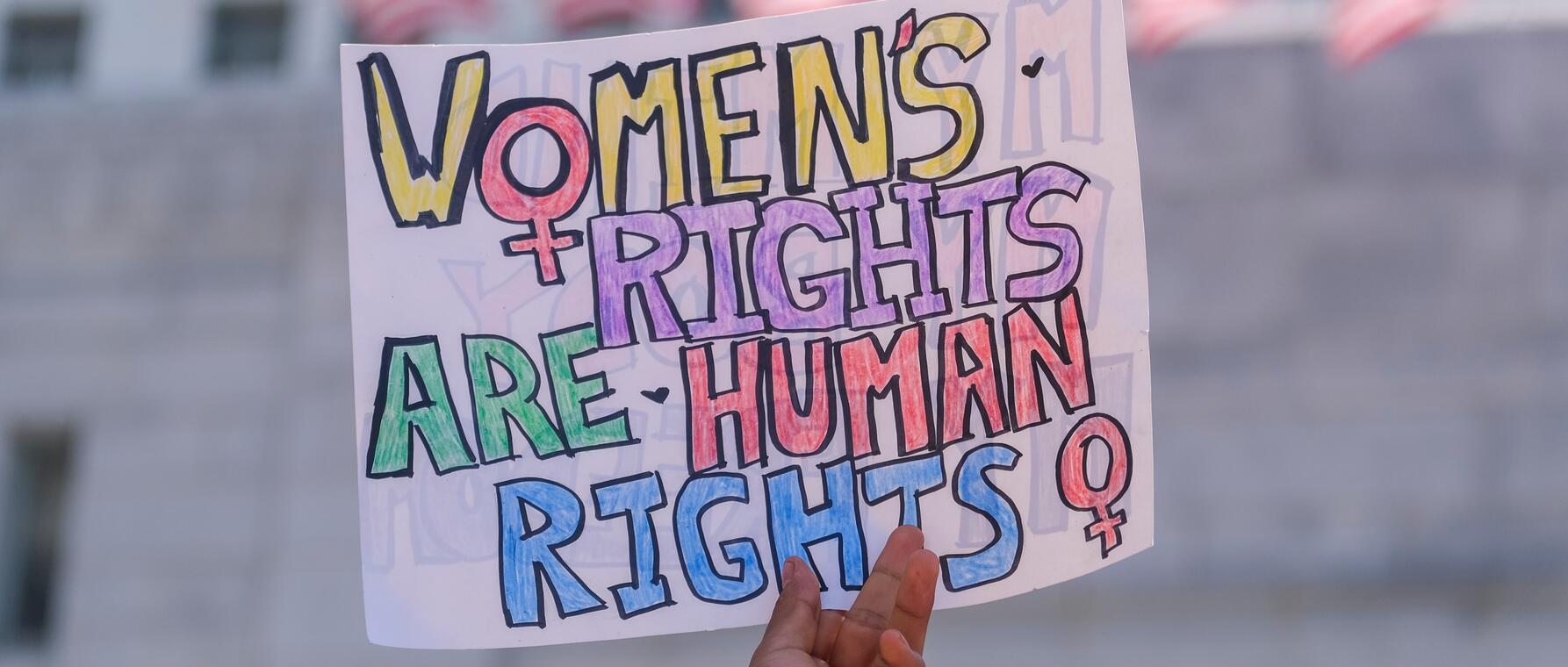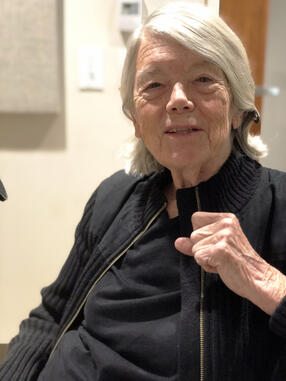Colloquy Podcast: Beyond 2024—Feminism and the Future of US Politics

“The future is female.” That was the slogan printed on T-shirts in the early 1970s at the first women’s bookstore in New York City. Fifty years ago, it seemed to be true. The Equal Rights Amendment to the Constitution had passed the House of Representatives and the Senate by wide margins and gone to the states for ratification. And, of course, women’s reproductive rights expanded with the landmark Roe v. Wade decision of the US Supreme Court.
Fifty years later, there has certainly been progress in gender equality, but the ERA is long dead and Roe has been overturned. We speak with Jane Mansbridge, PhD ’71, Harvard’s Charles F. Adams Professor of Political Leadership and Democratic Values and the author of the award-winning book Why We Lost the ERA, about whether the story of the 2024 election will be the way women voters reclaimed their lost rights and the promise of decades past.
So, let's start with a big-picture question: How did we get from the promise of the early 1970s for women to the loss of the ERA and, more recently, the rollback of reproductive rights?
Well, the probability of a backlash was always there. After all, we’re going against millennia of the subservience of women to men. For example, in the Bible, God is said to have told Adam that he would rule over Eve. That’s pretty basic, and it’s not easy to change something so basic so quickly. But I don’t think we could have predicted the power of the evangelical Christians.
The women’s movement actually brought the evangelical Christians into politics. Traditionally, that group, the evangelical Christians, both in the U.S. and elsewhere, had a theology that kept them out of politics, stressing that their true relationship was with God, not the world. But Roe v. Wade, the Supreme Court case in 1973 that legalized abortion before the third trimester, brought evangelical Christians into politics.
They were fueled by their dismay over Roe v. Wade and helped bring about the Reagan presidency in 1980. And you know they’ve been active in politics ever since. And I learned when I studied the ERA that they played a major role in defeating the Equal Rights Amendment because they brought busloads of women parishioners to state capitals to pressure the legislatures.
And then they played a major role in the election of President Trump, who then appointed the Supreme Court justices who overturned Roe v. Wade in 2022. That was one of the evangelicals’ major aims in their support of Trump, and they succeeded. So basically, a backlash could have been predicted. But the exact form that backlash took through the evangelical Christians would have, I think, been hard to predict.
You said a couple of years ago in an interview that the lesson of Why We Lost the ERA was that the incentives for political activism and the stresses of the activist life led the people who became activists to listen primarily to one another and not to the opposition. So how did that dynamic play out in the failure to pass the Equal Rights Amendment to the U.S. Constitution?
Lani Guinier, who used to teach the book in her class in Harvard Law School, called the dynamic of activists listening primarily to one another and not to the opposition the “dynamic of deafness.” And I love the phrase “dynamic of deafness.” I wish I’d thought of it myself and put it in a book. A good example of the dynamic of deafness, and the one I stress in the book, is what I call the decision by accretion to say that the ERA would require that women be drafted and sent into combat.
And two factors made that claim both deadly for passage and simply wrong. On the deadly for passage front, at the time, only 22 percent of the American public wanted women to be drafted and sent into combat. So when the proponents of the Equal Rights Amendment argued that the amendment would do that—that’s saying the amendment would do this thing that three-quarters of the citizens oppose—that’s not a good way to get it passed.
But the crazy thing was that that claim was completely wrong. The Supreme Court at that time had developed a doctrine called the doctrine of military necessity, which meant, among other things, that soldiers just didn’t have the same rights as civilians. If the military had said that drafting women and sending them into combat would impede its capacity to accomplish its military aims, the Supreme Court would not have stood in its way.

That was just a simple fact at that time. But the progressive lawyers who were battling for the ERA didn’t like the doctrine of military necessity. They thought that doctrine should be overturned. It wasn’t at all likely to be overturned at that time, but they thought it should be. So bottom line, the activists were saying that the Equal Rights Amendment would do this thing that three-quarters of the citizens opposed. But in fact, it wouldn’t have done that.
So to me, that’s a fascinating story. How did this happen? I said it was a decision by accretion, and that meant that it kind of crept up on everybody without any clear-cut moment of decision. No one weighed the pros and cons. No one deliberated over it. No conscious decision was ever made. Nobody other than the lawyers even knew about the doctrine of military necessity. It was taken for granted. And because the activists talked primarily to one another, you heard plenty of arguments against the draft but no arguments against drafting women if men were drafted. The activists assumed, incorrectly, that the ERA would cause women to be drafted and sent into combat on the same basis as men. And that turned out, of course, to be a huge argument against the ERA in those conservative states that had to vote for the ERA in order to get the three-quarters of the states necessary to put the amendment into the Constitution.
So, you know, we didn’t have the words that time, the phrase that time, “living in a bubble.” But that’s what I was saying the activists were doing.
Well, but it’s an important question and an important example even today. I’m wondering if you see the failure to listen to the opposition in the progressive movement and progressive politics. Has it had an impact on attempts to make progress on other issues like health care, education, or child care?
Well, just like health care, we, the progressives, heavily focused on single-payer health care. And we didn’t listen to the unions. The unions were split on this subject because many of them had very good existing health care plans, and they didn’t want to get rid of those for something else. So they were against single payer—and not all the unions. Unions were split. But we weren’t listening to that. We weren’t listening in general. So we failed to support Obamacare, which has many faults, no question about it. It’s definitely put together under stress. But it was the best we could do. And it helped many people.
The Democrats, like the left parties in most of Europe, have been taken over by the professional classes. So there are very few people in the party now from working-class backgrounds. And over time, despite Biden’s efforts with the unions, our lines to what the working people were saying have been attenuated. So, like in COVID, we protected the teachers, but we failed the students in ways that harmed many of the most vulnerable. And we didn’t have the voices from those people in the party. And I think it’s crucial, therefore, to get more people from working-class backgrounds into the Democratic Party so those voices can be amplified. And then the advances that we make in health care, and education, and child care, other issues, they’ll be directed by the interests of men and women across incomes, as well as across the urban-rural divide. And we’ll have the language, we’ll have the way of talking about it that makes sense to people. And I’ve started to say recently that progressives walk the walk—that is to say, we have fairly good policies for many, many people, the vast group of Americans—but we don’t talk the talk. It used to be the other way around.
The sociologist Tressie McMillan Cottom has made the point that in the polling, which shows the presidential race so close right now, she thinks that the voices they’re not capturing are the women she meets and she hears. And she says they are energized. They’re also really angry. They’re part of, really, the first generation of women who have fewer reproductive rights than the generation before them. What’s your take on whether or not we are missing the energy that women have right now in this campaign?
I don’t have any inner knowledge that you don’t have or that your listeners don’t have. And we know that polling has become more and more difficult because fewer and fewer people are responding to polls. The more scam phone calls there are—and there are more and more and more and more and more. And most people’s phones are even programmed to say this is probably a scam call. If you don’t have it in your contact list, you’re not going to listen to it. You’re not going to answer it. So there are very many fewer people answering poll questions these days. So it’s harder and harder to have—to understand what’s really going on.
I can’t give you an inner insight. But I think that one problem is that people don’t go to the polls. People can be very angry and still not go to the polls. And of course, if you make it difficult for people to go to the polls, if the lines are really, really long, if someone’s got a job and can’t get to the polls, then if you’re making it difficult, then it’s, of course, even worse. So even what you poll doesn’t necessarily reflect who’s going to turn out. It’s extremely difficult. We could indeed have a lot of energy from Black women. I, too, have friends and I’ve spoken with women who are very angry. Some men are very angry in the other direction. Whether either group turns out to the polls is a function not just of their anger but a function of how easy it is for them to vote, whether they voted last time, whether their job makes it easier to vote. And for a lot of people, their job doesn’t make it easier to vote. So I’m not saying anything new, and all of your listeners will know that it’s not that easy to extrapolate from the polls to what’s going on, what will happen on Election Day.
What’s at stake for women and for our democracy in the 2024 election? What happens if we don’t get this right?
A lot’s at stake for women, particularly in the realm of abortion, but less mentioned in the realm of funding. It’s going to be cut for so many programs that support women through what I would call a politics of care. Think of funding for elderly women on Medicare, funding for nursing homes, funding for maternal health. We’re incredibly lucky to have finally elected enough Black women to Congress that there was a critical mass to create an entire caucus called the Black Maternal Health Caucus in Congress. Maternal health is an issue that people are not paying attention to. And that funding is going to get—for those kinds of programs, is going to get cut. You need the right people in Congress. So that’s what’s at stake, I think, for women—is abortion has been made quite a deal of, and that’s an important issue, but there’s a lot behind it. The politics of care is going to take a big, big hit.
And I think what’s at stake for democracy is even scarier. Because we’ve never had anyone in a significant position of power in this country promise to root out his opponents using the military if necessary. And that’s only one of the promises that completely ignores the rule of law and the respect for others that lies at the very core of democracy.
In your 1980 book Beyond Adversary Democracy, you distinguish between adversary democracy, which assumes conflict between competing interests, and unitary democracy, which centers common interests. You explained in a 2020 interview that stable and successful democratic regimes need to find ways to move fluidly between their moments of conflict and their moments of closer-to-common interests. But in the same interview, you worried that in the United States today, conflict is tending to drive out commonality. Have you gotten more or less optimistic since then about our ability to find common ground?
Well, I’ve gotten both less and more optimistic about our ability to find common ground. I’ve gotten less optimistic for the reasons that listeners to this podcast will know all too well. Pew Research Center analysis finds that, on the average, Democrat and Republican citizens are farther apart ideologically today than at any time in the past 50 years. We know that. And we also know that social media are creating bubbles that keep us from listening to one another. Social media accentuates the likelihood of talking only to others who already believe what you believe. So social media, which we did not have in the early days of trying to pass the ERA, accentuates polarization. And Google Ngram, I looked up, told me that we’re more than 100 times as likely today that we’re saying—we’re living in a bubble than we were when the ERA was before the states.
And there are other reasons for polarization that some of your listeners will not know so well. Frances Lee at Princeton, who I think is the most exciting scholar writing about Congress today, has a book called Insecure Majorities, in which she maps the shift in incentives for members of Congress from 1940 to 1980. In those years, Democrats had a predictable, safe majority in both houses of Congress. They had hegemony in Congress. So when the Democrats were predictably in power—actually, so much so that one political scientist called the whole political system a sun-moon system. There would always be a big party and always be a small party in the United States. That turned out to be wrong. But it had gone on so long it seemed as if that was the U.S. system. And in those years—that long, long period of time, 40 years or more—it just—it made sense for Republican members of Congress to make nice to the Democrats so they could get their harbors, their new roads and so forth. And it made sense for the conservatives among the Democrats to reach out to the conservatives among the Republicans, the liberals among the Democrats, to reach out to the liberals among the Republicans to get their different bills passed. So there was a lot of incentive for constructive, trustful, and trustworthy interaction.
But once the majority in both houses of Congress became razor-thin, those incentives shifted. So it became in the interest of each party to destroy the members of the other party, doing anything within the law to attack their reputations and their capacity for re-election. Because one vote, two votes, could mean control of Congress. And that’s a big, big shift in incentives. And it was a big driver of polarization. So there are these understandable reasons, these bubbles of social media, the razor-thin majorities in Congress for those incentives to have moved away from trying to find common ground.
So then why are you also optimistic?
Yeah, right? Why don’t I just go out and jump in a ditch? Well, a couple of reasons.
First, one of the wonderful things about humanity is that we are inventive. And we’ve invented a new political form that does bring us together. We don’t do it too much in the U.S. yet. It’s called citizens’ assemblies or, in one version, deliberative polls. And in this new form, which is made possible by modern representative sampling, you can get a group of 200 or more citizens chosen through now what’s called a democratic lottery to come and be genuinely representative of the citizenry as a whole. And they can confer together and deliberate together for a weekend or several weekends on some important issue, and then they make recommendations to the government out of their deliberations. Or, in the case of the deliberative polls, they register their changes of opinion on the issue.
So citizens’ assemblies are essentially an antipolarization machine. Because in these small groups, 12 or so citizens, they talk together. They listen hard to one another. They actually come to like one another. Many of them, you get guys from Texas hugging someone on welfare from New York at the end of the whole weekend because they’ve come to understand each other a lot better. And most importantly, they’re listening to the arguments on the other side.
Now, these kinds of assemblies are spreading rapidly through Europe. There are some in Latin America. And in one instance in Europe, they’ve actually now been formalized as part of the government. The thing is, they’re expensive. Because you really want a good representative sample, and you have to pay the citizens pretty well to do that. And you have to recruit them actively. But once you get them together, you’ve got something you’ve never had before. And juries are different because they’re not truly representative and they’re smaller. But now, for the first time, you’ve got, really, a sample of the citizenry talking with one another. And it can bring us together, and it can create a lot of legitimacy for a proposed policy, even a fairly controversial policy.
And you said you had a second reason for hope. So what’s that?
Well, that’s also based on human beings being learning machines. And I appreciate that about human nature.
On the techniques for alleviating danger, we have learned a lot about how to negotiate. As you know, at Harvard, in business school and the law school, policy school—and that’s true all over the U.S. and even over the globe—among the most popular courses are the courses in negotiation. And they’re popular because they have direct payoffs in real life. You can actually learn these skills. And many of the techniques are summarized in the best-selling book Getting to Yes, which some of your listeners may have read. Fifteen million copies sold worldwide. I think it was maybe 36 languages it’s been translated into.
One of the central techniques, which was discovered by the pioneering thinker Mary Parker Follett—listeners, please remember that name, Mary Parker Follett—she’s one of my heroes—in 1925 but not accorded sufficient attention until recently—she came up with the idea that’s been formalized now—is look for the interests behind the positions. So one person comes in advocating a position that—and the other one can’t give it to them because it’s asking too much. So that means, in the usual situation, no deal. You’re asking more than I can give. But then if you talk with one another and you try to look for the interests behind the positions, Why is the person taking that position? then, sometimes, you can give them what they really want. Can I take just a minute and tell you about Mary Parker Follett’s example?
She was sitting in the Harvard library, and another patron came in. And he wanted the window a little bit open to cool off the room, but she would have had a draft on her. So they could have opened the window just an inch. Then she would have had the draft, and the room wouldn’t have gotten very cool. And she said, what about opening the window in the next room, where nobody’s sitting in front of it? He didn’t want the window open. He wanted a cool room. She didn’t want the window closed. She wanted no draft. So was there some way of getting a cooler room with no draft? Yes, the window in the other room.
So if you begin to look at the interests behind the positions, maybe you can give them something that meets their needs that’s at lower cost to you than what they’re asking. That’s huge. And the second is that if you bundle a bunch of positions together, a bunch of issues together, then you can get a whole bunch in which what’s of high value to me but is relatively low cost to you—there are a bunch of those—and then there are some that are high value to you and relatively low cost to me. And the bundle is really good for both of us. So bundle them.
That’s what Congress can do, and that’s what it does do. But the teaching of negotiation teaches you to look for that. What can I bundle together? What do they really want? But to find out what you really want, you have to talk to people. We’re now taking these lessons into the world of politics from business, which has been working with them for a long time. And the Hewlett Foundation has supported the creation at American University of the first-ever program on legislative negotiation. And they’re training congressional staffers, and the staffers are lining up both sides of the aisle. The members of Congress are saying to their staffers, take this training because we want you to be able to work well in negotiation. And so that’s the second human invention, besides citizens’ assemblies, really good negotiation, that I find a cause for optimism.
Banner image courtesy of Shutterstock.
Get the Latest Updates
Join Our Newsletter
Subscribe to Colloquy Podcast
Simplecast





